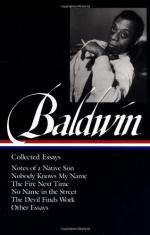|
This section contains 471 words (approx. 2 pages at 300 words per page) |

|
James Baldwin has long been a champion of the Person over the People. The fight against racial and other injustices, he argued as early as Notes of a Native Son (1955), begins with the heart's purification of hatred and despair. For Baldwin, the fight was with oneself: "my life, my real life, was in danger, and not from anything other people might do but from the hatred I carried in my own heart." Salvation must be personal before it can become social and political. (p. 37)
More than ever before, Baldwin fits much of his commentary [in No Name in the Street] into an ideological framework, albeit one in which the devil is more recognizable than the savior…. But the dramatic center of the book is not here; the center, in fact, is closer to the personal struggle in the earlier work than to a political thesis or to special...
|
This section contains 471 words (approx. 2 pages at 300 words per page) |

|


